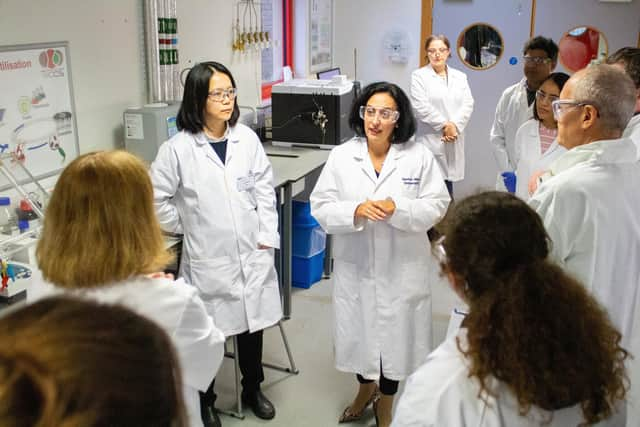Heriot-Watt backs new £18 million centre to drive UK's green industrial revolution
A new £18 million centre for doctoral training involving Edinburgh’s Heriot-Watt University will launch today to help back the UK’s green industrial revolution.
The Centre for Doctoral Training in Green Industrial Futures builds upon the pioneering work of UK Research & Innovation’s (UKRI) Industrial Decarbonisation Research and Innovation Centre (IDRIC). According to European Investment Bank research, four out of five companies consider skills shortages to be a barrier to their net zero projects.
Advertisement
Hide AdAdvertisement
Hide AdDelivered by a consortium comprising four top research universities - Heriot-Watt, Imperial College London, University of Bath and University of Sheffield - the latest centre represents an £18m investment from UKRI through the Engineering and Physical Sciences Research Council (EPSRC). It will play a key role in training the next generation of innovators and leaders to deliver the technologies, systems and solutions required to transition UK industry to net zero emissions by an agreed deadline of 2050. The centre’s graduates will help develop the expertise and skills to tackle the biggest decarbonisation challenges facing industry.


Mercedes Maroto-Valer, director of the Centre for Doctoral Training in Green Industrial Futures (CDT-GIF) and UK industrial decarbonisation champion, said: “The outstanding research and cross-sector partnerships cultivated through IDRIC have paved the way for this ambitious centre for doctoral training. By building directly on IDRIC’s foundations, we can hit the ground running to produce the doctoral talent and innovation pipeline that UK industry urgently needs to lead the global energy transition.
“This holistic approach will produce graduates with vital cross-disciplinary skills in systems thinking, industrial literacy, and the ability to contextualise and deploy decarbonisation technologies within the wider global system.”
Alongside a four-year research project, the CDT-GIF students will undertake advanced training in the social, environmental, economic and regulatory aspects of the net zero transition in industry, as well as professional development in areas such as business strategy, commercialisation, “responsible innovation” and policy engagement. Students will also have the opportunity to visit some of the world’s major pilot and demonstration facilities. The new centre is also seeking industry partners to co-create research projects.
Maroto-Valer added: “Our CDT graduates will emerge as true energy transition leaders, not only technical experts, but also multidisciplinary professionals who understand the complex societal implications of decarbonisation and can effectively engage with industry, policymakers and the public. Our programme will also emphasise the importance of a just transition which accounts for the impacts on workers and communities affected by industrial decarbonisation. Ensuring fairness and creating high-quality employment opportunities will be key social considerations.
“With these future-focused capabilities, our graduates will be ideally positioned to drive the innovation and public acceptance needed for UK industry to remain competitive in a net zero world.”
IDRIC was launched in 2021 to accelerate research and innovation in industrial decarbonisation. It is currently collaborating with more than 200 partners and stakeholders including academic institutions, industry, community representatives and policymakers to address urgent innovation needs. Key stakeholders in industry, academia, policymakers, local government, NGOs, trade organisations and skills boards were involved both in the scoping of the centre’s funding calls to establish research needs as well as the selection process itself.
Comments
Want to join the conversation? Please or to comment on this article.